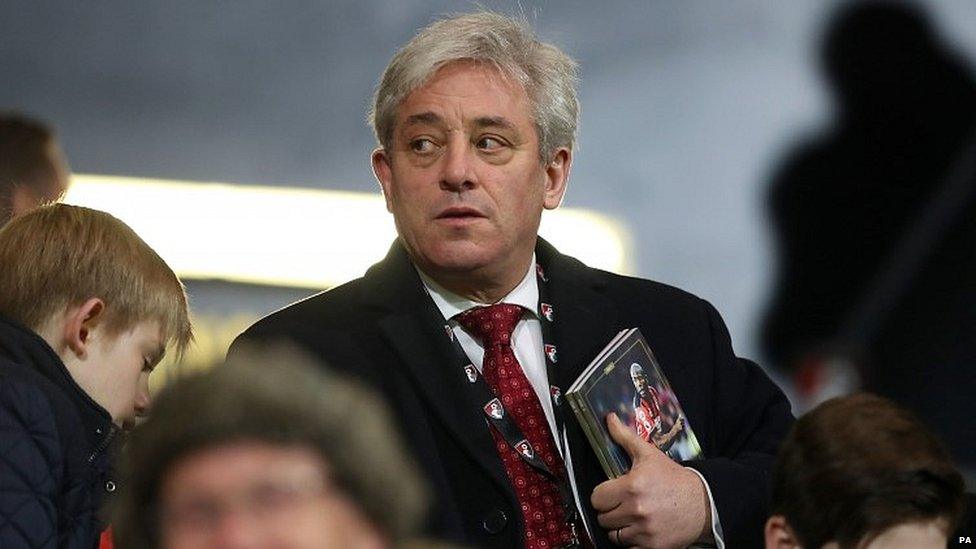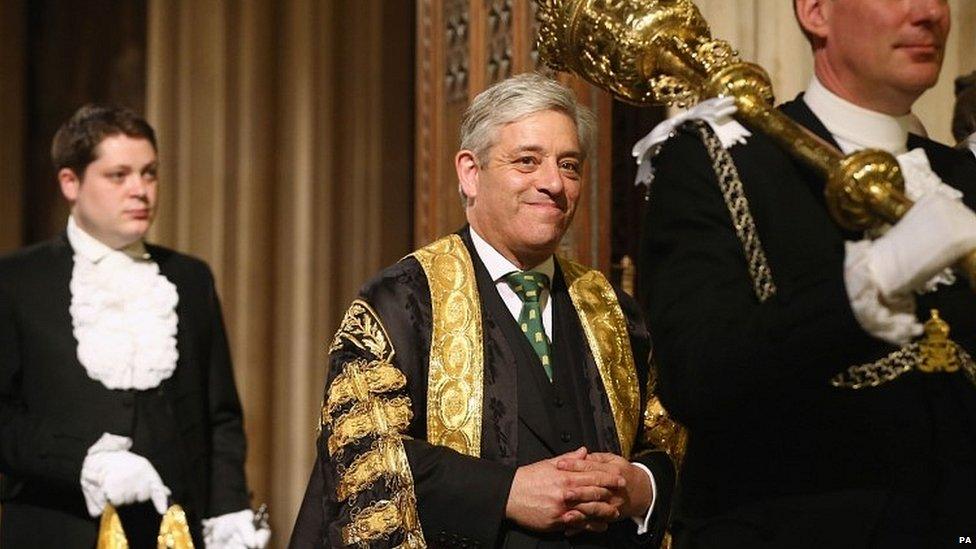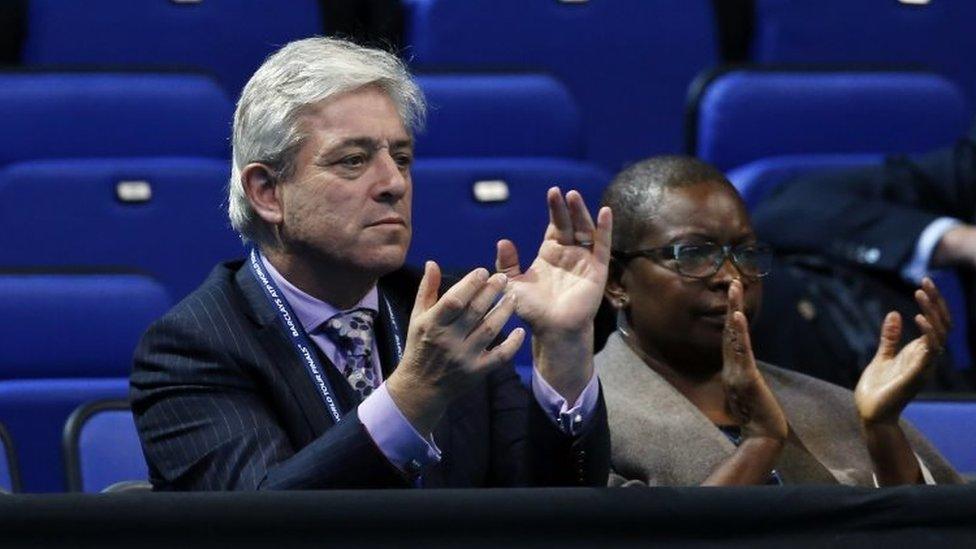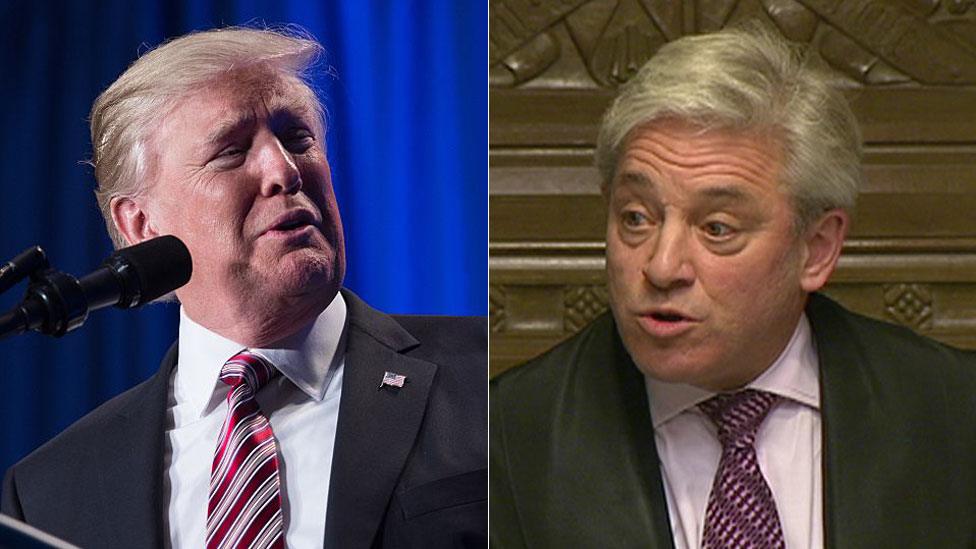John Bercow: Why the Marmite Speaker is staying put
- Published

John Bercow may have irritated some MPs but he has his admirers as well as his detractors
Bye, Bye, Bercow? I don't think so.
The coverage of one MP's Early Day Motion (EDM) of no confidence in the Speaker, in the wake of his comments about President Trump, is massively over-egged.
First, it's an EDM. They are a form of parliamentary graffiti - a way of expressing an opinion, and nestling amongst the 946 EDMs on such subjects as the Queen's sapphire jubilee, diplomatic relations with Armenia, the Battle of Cable St and organised dog fighting, it has so far attracted a single signature - although that might change when MPs return from their holidays.
But the more important point about EDMs is that some special parliamentary acrobatics are needed for them to be debated on the floor of the Commons.
The government could provide the time, but it won't. An opposition party could give up some of its allocated time, but they won't. The Backbench Business Committee, which controls its own block of Commons time, could allocate a slot - but it almost certainly won't.
So no debate. But what if a large number of MPs do, eventually, sign it? Will a shamed Speaker Bercow retire to his state dining room with a bottle of his own-brand whisky and a loaded revolver? I strongly doubt it.
This Speaker saw off a coup attempt on the last day of the 2010 Parliament, when the coalition whips attempted to change the rules on Speaker elections as a precursor to an attempt to unseat him after the general election.
That vote was effectively a direct attack on the Speaker - and was supported by 202 MPs. Yet Speaker Bercow did not resign. Like another Marmite politician, he's a fighter, not a quitter. And no-one should make the mistake of assuming he is universally loathed by Tory MPs.
Hardline moderniser
The Bercow phenomenon is a complex thing. On the one hand, he's a hardline parliamentary moderniser. On a cosmetic level, he has ditched the grand gold-embroidered robes worn by his predecessors, and most recently, presided over the decision to abandon the court dress worn by the Commons Clerks.
But more importantly, he has opened up the procedure of the House, with historically important results.
A few months back I wrote about how his rulings provided the parliamentary openings that led to pro-Brexit MPs cornering David Cameron into conceding the EU referendum. But he has also allowed 353 Urgent Questions, putting ministers on the spot on topical issues, so that the Commons is visible on the TV news, debating the issues of the moment. In the 21st Century that is essential.

The Speaker has made the Commons less arcane and increased the power of backbenchers
MPs also appreciate his brisk conduct of question times, giving many more their moment in the Parliamentary limelight.
But then there's the other side of the coin. His put-downs can be brutal, and Tory MPs believe he targets them more often than the opposition - although the Lib Dems, still smarting from the duffing up of their leader, Tim Farron, at PMQs the other week, might argue that they get swatted too.
Where other Speakers might have poured on a little honey "the Right Hon Gentleman who is a distinguished parliamentarian, should know better…", Bercow's repartee - like his admonition to Tory Tim Loughton "the children's minister should stop acting like a child" - has not been forgotten or forgiven by its targets.
His stand-up shouting match with the then government Chief Whip, Patrick McLoughlin, on the floor of the Commons, may be the most spectacular example of a loss of temper, but it's not the only one.
To quote Kipling, the burnt Speaker's bandaged finger goes wabbling back to the fire.
Rough and smooth
But there are plenty of reasons why I expect him to survive. First there is no Commons majority to remove him. Support for the Speaker may be the love that dare not speak its name in the Conservative 1922 Committee, but there is a solid phalanx of Bercow-supporting Tories out there.
As one senior member of this elusive group put it, "with this Speaker, you have to take the rough with the smooth". They believe his failings are a price worth paying for a Speaker who they believe facilitates tough scrutiny of the government.
Second, the government has learned the lesson of its attempt to remove him on 26 March 2015, and doesn't want to place its dabs on the dagger this time.
And without a government whipping operation behind it, any direct attempt to topple the Speaker is doomed.
Third, MPs want to protect the Office. This is a more subtle point. If the Speaker is to be dethroned, his successor will feel vulnerable from day one. They will be less willing to offend, not just ministers, but pretty much anyone.
And that means the rights of individual MPs and backbench groupings like the pre-referendum Brexiteers to make life difficult, may be less diligently enforced. This argument convinces a lot of older hands who are not obvious Bercow backers on other grounds.
Fourth, he's going anyway. Perhaps later in this Parliament than some may hope, but he's been in the Chair since 2009, and that's a pretty long spell. So why mount a putsch when success is not guaranteed and there's a price to be paid?
So when the Bercow era does end, it will be at a time of his choosing.
- Published7 February 2017

- Published6 February 2017
